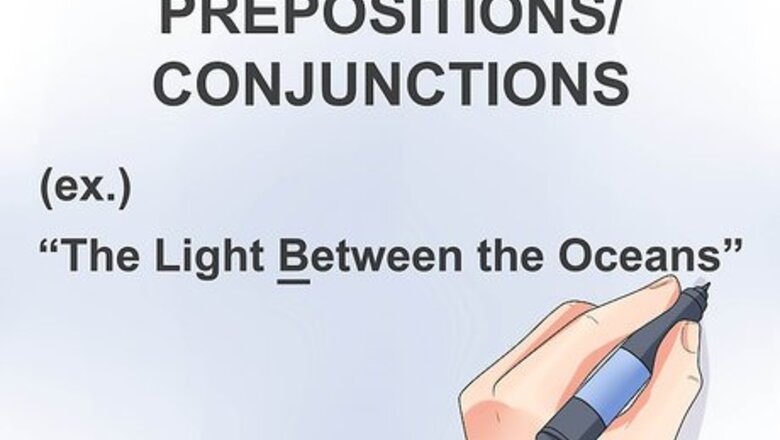
views
Following General Capitalization Rules
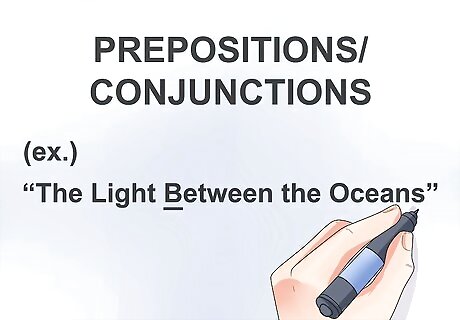
Make all words five letters and longer capital. Even if the words are prepositions or conjunctions, which are not usually capitalized, they should be capitalized if they are five letters or more. To demonstrate, the conjunction “between” is capitalized, such as in the novel The Light Between the Oceans. There are some styles that take exception to this rule. Associated Press and MLA capitalize words with four or more letters, APA with five or more, and Chicago Manual of Style doesn't base capitalization on word length. Always be aware of what style is required.
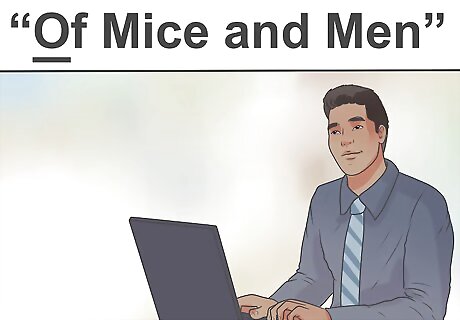
Capitalize the first and last words of the book title. Despite word length, and whether the word is a conjunction, preposition, or an article, the first and last words should always be capitalized. For example, in the novel Of Mice and Men, the word “of” is capitalized even though it is a preposition that is less than five letters.
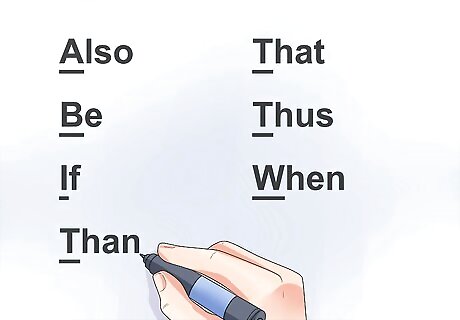
Capitalize the following words each time: also, be, if, than, that, thus, and when. Regardless of word length, part of speech, or position of the word within the title, these words are always capitalized.
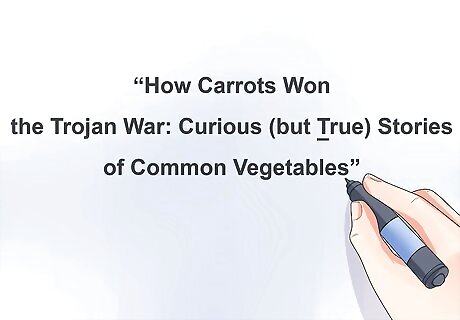
Apply all of the same rules when a book contains parentheses as part of the title. The content within the parentheses should follow the same rules regarding parts of speech and word length. However, they do not follow the rule about capitalizing the first and last words within a title, unless the parentheses actually appear at the beginning or end of the book title. To illustrate, in the book (Un)arranged, the prefix “un” is capitalized because it appears as the first “word” of the book title. However, when the parentheses appear in the middle of the title, such as in the book How Carrots Won the Trojan War: Curious (but True) Stories of Common Vegetables, all capitalization rules apply. The word “but” is not capitalized because it is a conjunction, while the word “true” is capitalized because it is an adjective.
Capitalizing Nouns, Verbs, Adjectives, and Adverbs
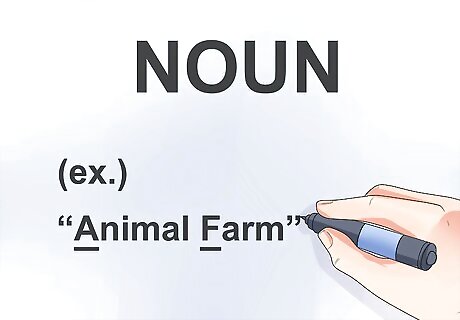
Locate all nouns and capitalize them. A noun is defined as a word that identifies a person, animal, place, thing, or idea. Capitalize all nouns, even if they are less than five letters. For instance, in the title Animal Farm the word “animal” is capitalized because it is an animal, and “farm” is capitalized because it is a thing (despite being less than five letters).
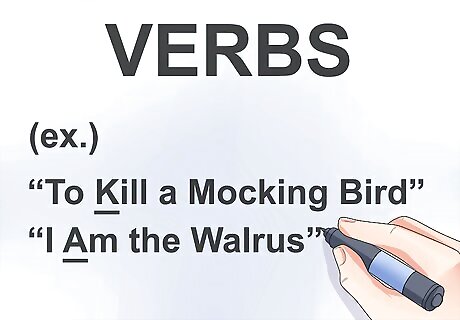
Find all verbs and capitalize them. Verbs are “doing” words that express a physical action, a mental action, or a state of being. Capitalize all verbs, even if they contain fewer than five letters. For example, in the novel To Kill a Mocking Bird, “kill” is capitalized because it is an action verb, even though it is less than five letters. Common verbs that cause difficulty are: be, been, am, are, is, was, and were. For instance, in the title I Am the Walrus, “am” is capitalized because it is a verb that demonstrates the action of being.
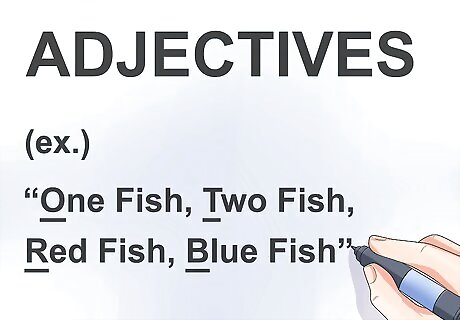
Capitalize all the adjectives in the title. Adjectives are words that describe or modify a noun. They are used to describe what kind, what color, or how many nouns are being described. Capitalize any words that describe nouns, even if they are less than five letters in length. To demonstrate, in the book One Fish, Two Fish, Red Fish, Blue Fish'‘, all numbers are capitalized because they are adjectives and describe how many fish are present. Additionally, the colors “red” and “blue” are capitalized because they describe the looks of the fish.
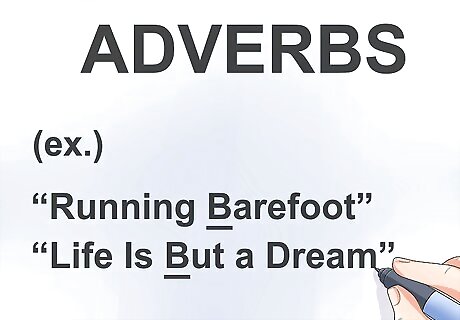
Locate all adverbs and capitalize them. Adverbs modify verbs and describe when, where, or how an action is completed. Adverbs will often end in “ly” but they do not always. Capitalize any adverbs, even if they are less than five letters long. To illustrate, the word “barefoot” in the novel, Running Barefoot, is capitalized because it describes how one is running. Occasionally, the conjunction/preposition “but” will function as an adverb and should be capitalized in these situations. When it is used as an adverb, it will immediately follow a verb and can be replaced by words like “only” or “just”. For example, in the title Life Is But a Dream, “but” is capitalized because it describes the verb “is”.
Leaving Conjunctions, Prepositions, and Articles Lowercase
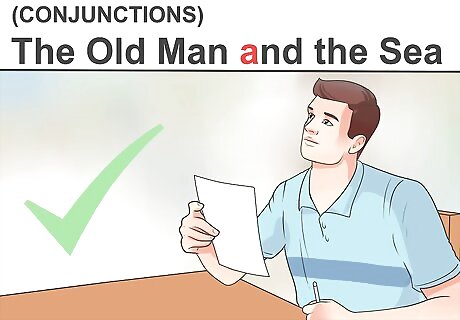
Avoid capitalizing conjunctions. Conjunctions are words that join together other words, or groups of words. Common conjunctions are words such as “and,” “or,” and “nor”. Conjunctions should only be capitalized if they are five letters or more in length. For example, in the novel The Old Man and the Sea, the word “and” remains un-capitalized because it is a conjunction that is of lesser importance and is only used to join together groups of words. Regardless of length, conjunctions should be capitalized if they are the first or last word of the title.
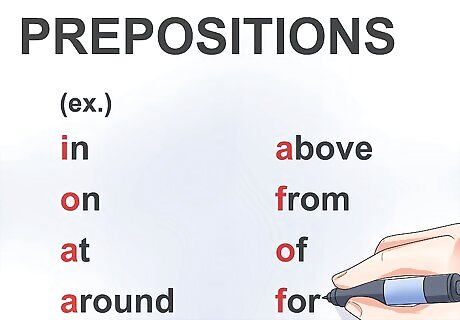
Don't capitalize prepositions. The word preposition means “positioned before,” so prepositions are words that precede a noun, and demonstrate a relationship between two words. Common prepositions include: in, on, at, around, above, from, of and for. Avoid capitalizing prepositions, unless they are five letters or longer. To demonstrate, in the novel The Wizard of Oz, “of” is the preposition which shows the relationship between the Wizard, and the land of Oz. It remains lowercase because it is a preposition that is less than five letters. Prepositions that are five letters or longer should be capitalized. For instance, the preposition “among” is capitalized in the novel, A Walk Among the Tombstones. Regardless of length, prepositions should be capitalized if they are the first or last word of the title.
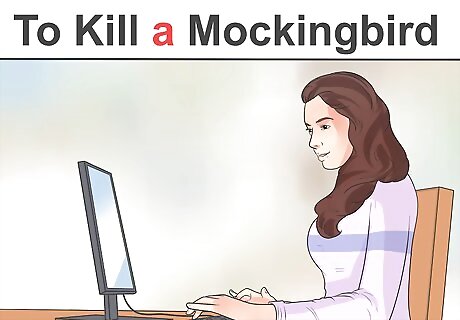
Leave articles lowercase. Articles are used to demonstrate to the reader whether a noun is specific or non-specific. Articles in English include “the,” which is a definite article, and “a,” and “an,” which are indefinite articles. To illustrate, in the novel To Kill a Mockingbird, “a” is an indefinite article, and is therefore not capitalized. The only time articles should be capitalized is when they are the first or last word of the title. For instance, in The Great Gatsby, the article “the” is capitalized as the first word of the title.


















Comments
0 comment